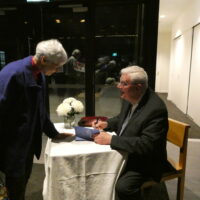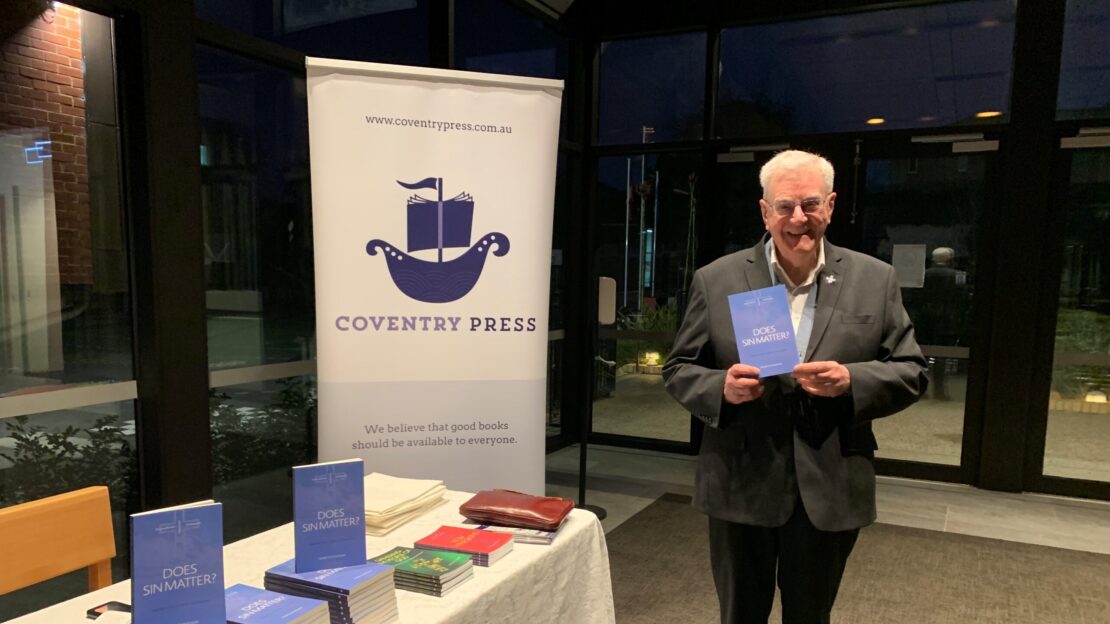Congratulations to Fr Frank O’Loughlin on the launch of his new book, Does Sin Matter? Separation, Reconciliation, Redemption. A large crowd gathered in the Gathering Space at Our Lady of Good Counsel, Deepdene last Wednesday evening for the Launch.
Fr Frank will explore the book over two more evenings. You are welcome to join us:
Wednesday 14 September: Biblical Foundations of Sin
Wednesday 21 September: The Future of Sin!
These will take place from 7.00 pm to 8.00 pm at Our Holy Redeemer Church, 4 Barton Street, Surrey Hills. No registration is required.
Fr Frank is also the author of New Wineskins: Eucharist in Today’s Context and Gathering the People of God.
Does Sin Matter? Separation, Reconciliation, Redemption was published by Coventry Press and is available for purchase from the Parish Office for $27.95 (payment by credit card or Electronic Transfer of Funds preferred).



Father Michael McEntee officially launched the book which was published by Coventry Press. Here is the text of Fr Michael’s address at the launch:
A WORK OF FAITH AND RESEARCH
Our author is well-known to us. We owe him our thanks for this rich text that is the fruit of a long life of faith lived most fully, and the fruit of the author’s hard work. Frank has given us a bird’s-eye-view of a wide spectrum of biblical and theological resources that encourage us sinners to know the joy of a life of faith.
Even so, prior to our debt of thanks to Frank, we owe a double debt of thanks to God. First for the self-revelation of God in the inspired Scriptures that are the warp of the text, and, second, for God’s guidance through the centuries of theologians and believers whose reflections and experiences are the woof of our text. Warp and woof appear now as a firm and pleasing weave, at once substantial and easy to read, thorough and brief, historically informed and pastorally relevant. The text that Frank has woven provides us with a careful, profound and fresh acquaintance of the living Tradition of Christ’s Church.
The current pontificate is driving an understanding of Tradition as a gift of the Holy Spirit to the Church that aligns the lived experiences of believers today, and their questions arising from experience, with the sure patrimony of the Scriptures and the oral and written teaching that has taken place down the centuries.
Frank’s life-long research, dare I say daily-updated with the exception of the Lord’s Day, is the source of the persuasive character of his text. He has uncovered elements of the tradition that have passed from our memory. He has sifted and weighed these discoveries through the prism of the pastoral reality of the twenty-first century believer in the Catholic Communion. Through that prism, the gospel will touch uncertain believers and other seekers after faith.
Summing up, we have a precious vademecum of Scriptural, theological and pastoral insights into the experience of sin and the gift of redemption.
THE FUNDAMENTAL INSIGHTS OF THE TEXT
1.Two crucial quotations (pp. 27-29) taken from theologians Francine Charoy (2020) and James Keenan (2015) analyse the malaise of the received understanding of sin, and the trajectory of a renewed understanding. Charoy points to the detachment of our understanding of sin from the biblical, relational, understanding in favour of a legal understanding, as well as the lack of attention given to the concreteness of moral choices made by responsible persons in specific situations. Keenan traced the developing awareness of the social impact of sinful actions. Frank has developed their contribution in two ways. First, developing Keenan’s point, he emphasises the mystery of a power of evil in the world to which, God, in his love of his creation, provides a remedy, the redemptive presence of the Word incarnate in Jesus of Nazareth. Second, by paying attention to the ‘sin of the world’, he clarifies what would be a renewal of our awareness of sin and of the current practice of repentance and forgiveness.
2.The Church professes the forgiveness of sins in both the Apostles and Nicene Creeds. This creedal affirmation stems from two crucial biblical truths that contribute to a renewed understanding of sin. First, the relational dimension present in the covenant entered into by the Lord with Israel, perfected in the new Covenant in Christ’s blood. Second, reflection on sin sits within an awareness of the Paschal Mystery of Christ’s life, death, resurrection and sending of the Holy Spirit. “We believe in the forgiveness of sin … as the power of Christ’s death and resurrection being applied to us. … (S)in – that the Scriptures see as separation from God – is overcome by the loving goodness of God, who draws us into union with himself.” (p. 31)
THE GIFT OF THE TEXT
The structure of the text is simple, favouring easy assimilation of the proposed interpretation. I want to draw attention only to the Appendix.
1.This sampling of ‘penitential services of redemption’ is a crowning jewel, aglow with the light of the timeless tradition of the Church’s public prayer. A vocabulary of redress that society uses so often cannot bear the weight of the mystery of separation and redemption presented in our text. Allow me to suggest one possible instance. Could we imagine how our church may have been recognised as a community intent on serving the healing of survivors of sexual abuse had those universal, timeless, profound expressions of weakness, failure, evil, regret, sorrow, forgiveness and trust been availed of regularly in our public prayer.
2.The Appendix is a significant advance on the regular proposals to permit the routine celebration of the current third form of the Rite of Penance. These proposals are made in good faith but they are misdirected as a remedy for our current malaise. The Church’s malaise regarding the proper understanding of sin and sins, and regarding the sacrament of penance and forgiveness needs a precise diagnosis. Frank proposes a diagnosis that casts a kindly light on our confusion.
THE ACHIEVEMENT OF THE TEXT
During his pastoral visit to Slovakia last September, in a very significant reflection on authentic Christian freedom, creativity and dialogue, Pope Francis addressed the archbishop and bishops, the priests and deacons, the consecrated religious, seminarians and catechists.
“The younger generations are not attracted by a faith that leaves them no interior freedom. … Train people for a mature and free relationship with God”, he said. Reflecting on the evangelising genius of Saints Cyril and Methodius who “learned (the) language and assimilated (the) culture” of the Slavic people, he posed his challenge to bishops, theologians and catechists everywhere. “We are heirs to a rich Christian tradition (that) for many people … is a relic from the past. … Faced with the loss of a sense of God and of the joy of faith, it is useless … to judge and blame the evil world. … We need the creativity of the Gospel … it is still active, it is still unfolding. … Liberty and creativity … What a fine thing it is when we find new ways, means and languages to proclaim the Gospel! We can use our human creativity (whose) great source … is the Holy Spirit!” (https://www.vatican.va/content/francesco/en/speeches/2021/sepember/documents/20210913-bratislava-religiosi.html, accessed 15 September 2021)
With Does Sin Matter? Frank has ably, clearly, firmly and gracefully absolved this task.
I am honoured to launch and to offer for your reading and reflection the latest work of Reverend Doctor Frank O’Loughlin Does Sin Matter?




Comments
Add Comment